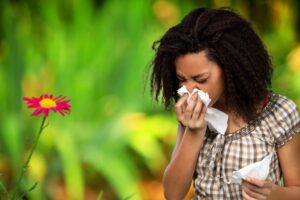September 26, 2025 | Black & Kletz Allergy

There are 17 species of ragweed in North America. The only state in the U.S. without ragweed is Alaska. Each ragweed plant produces approximately 1 billion pollen grains. The ragweed plant lives only 1 season. Although ragweed is almost ubiquitous in the U.S., the pollen is even more widespread in rural areas. Ragweed is typically found along the side of the road, in vacant lots, in fields, and along riverbanks. Environmental factors play a role in the release of ragweed pollen. The warm weather in combination with the wind and increased humidity augments the release of ragweed pollen which in the mid-Atlantic region tends to begin in mid-August, peak in mid-September, and end with the first frost which typically occurs in late October. The ragweed pollen count tends to be its highest during the midday and lowest in the early mornings. The pollen released from the ragweed plant can travel hundreds of miles, like other pollens, so most of the U.S. population is exposed.
Most weed-sensitive individuals complain of the typical allergy symptoms associated with allergic rhinitis or allergic conjunctivitis. The symptoms may include sneezing, runny nose, nasal congestion, post-nasal drip, sinus congestion and pressure, sinus headaches, fatigue, itchy nose, itchy throat, snoring, itchy eyes, watery eyes, puffy eyes, and/or redness of the eyes. Individuals with asthma may also have an exacerbation of their asthma with symptoms such as wheezing, coughing, chest tightness, and/or shortness of breath. Patients prone to sinus infections (i.e., sinusitis) may develop a sinus infection during the autumn as a result of the high weed pollen count.
In addition to weeds, there are other environmental allergens that may be responsible for an uptick in allergy symptoms to allergic individuals in the autumn. Besides ragweed and other weeds, molds, dust mites, pets, and cockroaches are common allergens that may play a role in inducing allergic rhinitis, allergic conjunctivitis, and/or asthma symptoms in susceptible individuals. In fact, all of these allergens are perennial and may be bothersome to sensitive individuals throughout the year, not only in the autumn. In particular, leaf mold is quite annoying to many allergy sufferers, particularly to people who like to garden and rake leaves. It should be noted that dust mites, pets, and cockroaches are indoor allergens whereas weeds are outdoor allergens. Molds, however, are both indoor and outdoor allergens and are particularly bad in the Washington, DC metro area because DC was built on a swamp and there is high humidity in this region.
It is also interesting to note that there are certain foods that are closely associated with ragweed such that when eaten by ragweed-sensitive individuals, they may experience an itchy mouth, throat, and/or lips. People with this condition are said to have oral allergy syndrome or pollen-food allergy syndrome. It occurs in response to eating certain raw or uncooked fruits, vegetables, and/or nuts by the ragweed-sensitive person. Occasionally, one may experience itching of the hands when touching raw foods. Some examples of foods associated with ragweed pollen allergy include banana, melon (e.g., honeydew, cantaloupe, watermelon), chamomile tea, cucumber, zucchini, white potato, dandelion, sunflower seeds, and artichoke. Although ragweed-sensitive patients may develop an itchy mouth, throat, and/or lips when they eat these foods raw or fresh, when the fruit or vegetable is cooked or canned, the protein is denatured and thus destroyed which usually prevents the allergic reaction from occurring. In most cases, individuals are able to tolerate cooked and/or canned fruits and vegetables. Of note, oral allergy syndrome may also occur in individuals who have other pollen allergies such as tree pollen. A classic example of this is that some individuals who have birch tree allergies will have itching of the mouth, throat, and/or lips when eating raw or fresh pitted fruits (e.g., apples, peaches, plums, pears). Extra caution needs to be taken in cases where nuts cause symptoms because many individuals can have a classic nut allergy that is not associated with pollen which may be life-threatening. Such individuals should be prescribed a self-administered epinephrine device such as an EpiPen, Auvi-Q, Adrenaclick, or Neffy, an epinephrine containing nasal spray. Patients should be instructed that if they use the self-administered epinephrine device, they should go immediately to the closest emergency room.
The board certified allergists at Black & Kletz Allergy has 3 convenient locations in the Washington, DC metro area. We have offices in Washington, DC, McLean, VA (Tysons Corner, VA), and Manassas, VA which all offer on-site parking. The Washington, DC and McLean, VA locations are Metro accessible and there is a free shuttle that runs between the McLean, VA office and the Spring Hill metro station on the silver line. Please call us to make an appointment or you can click Request an Appointment and we will reply within 24 hours by the next business day. The allergy specialists of Black & Kletz Allergy are eager to help you with your autumn allergies (i.e., hay fever), asthma, hives, swelling episodes, mast cell condition, eosinophilic esophagitis, sinus issues, or any other allergy and immunology problems. We are dedicated to providing first-rate care to you as we have been doing in the Washington, DC metro area for more than 50 years.












